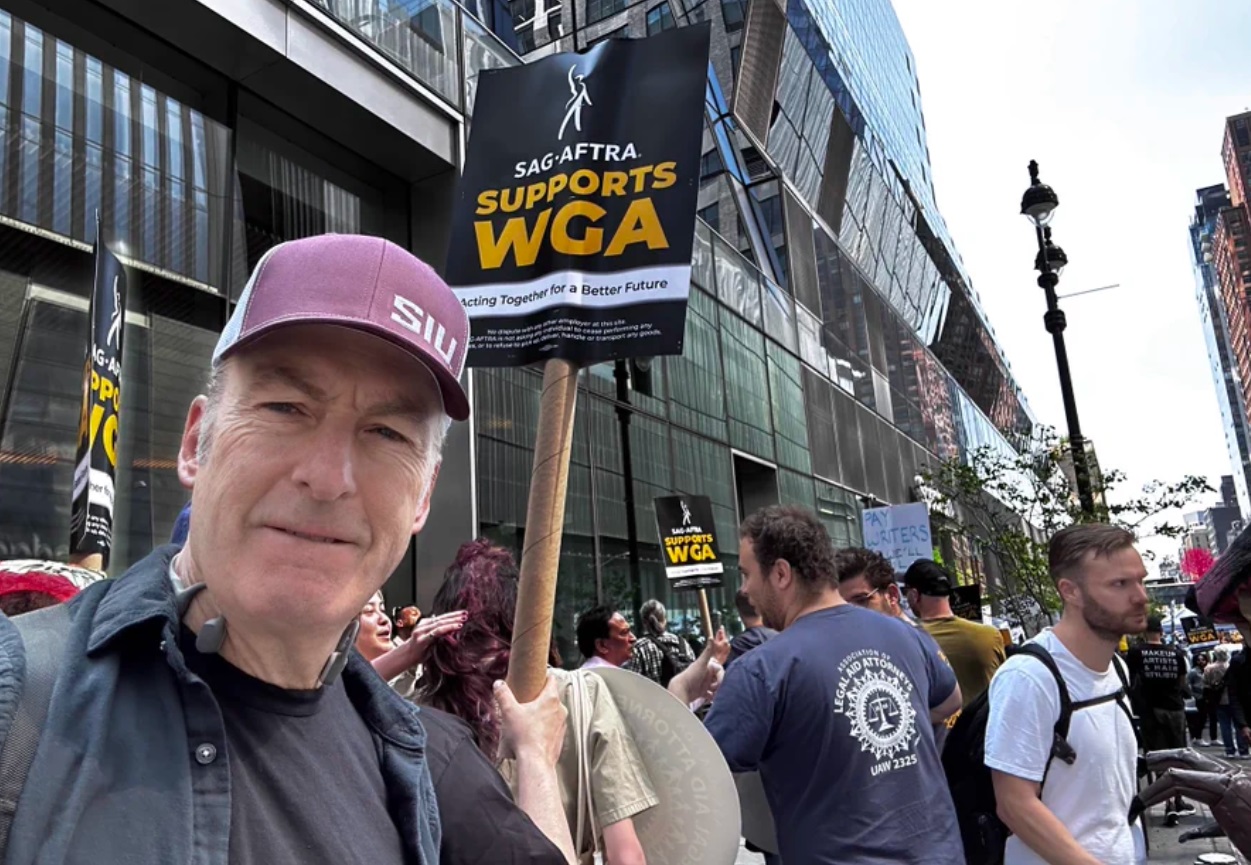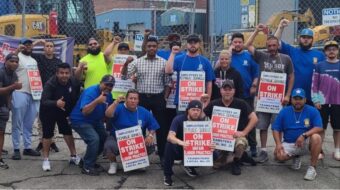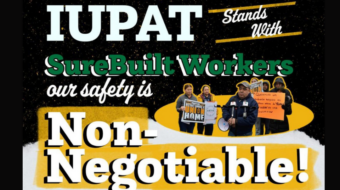
WASHINGTON — The labor movement may be graying, according to federal data, but not according to opinion polls for the AFL-CIO, and not according to a panel of young workers gathered there in the run-up to Labor Day to answer the question, “Why unionize?”
The answers were as varied as the four young workers, and one high school teacher, who discussed the burgeoning youthful movement in the labor movement as a highlight of the federation’s pre-Labor Day celebration of the achievements and examination of the problems facing U.S. workers.
But they all come down to simple propositions: Living wages, good benefits, workers’ rights, and respect on the job.
The answers echoed the findings of an AFL-CIO-commissioned poll, which showed the highest support for workers in 60 years, including for strikes. And the answers jibed with points federation President Liz Shuler made in her keynote address to the standing-room-only August 29 session.
“More than two-thirds of people in this country believe in unions. Do you know how hard it is to get two-thirds of Americans to agree on anything?” Shuler asked.
“The idea of a union may sound complicated, but in reality, unions are just a group of people coming together,” Shuler said. “They are about each of us becoming the most powerful version of ourselves that we possibly can.
“And there is nothing better than finding that power…alongside the people we work with, and being a part of something bigger than ourselves. That’s all a union is. It’s that simple.”
The young workers, and one of their unionized adult teachers, hit the same themes of decent pay, good benefits, and protection on the job from bosses’ whims.
So did the poll of 1,200 registered voters, young and old. It reported wide bipartisan support not just for unions (71%-19%, including 52%-36% among Republicans) but for strikes for better wages, benefits, and working conditions (75%-21% including 58%-39% among the GOP).
Intergenerational support
The support is intergenerational, too. Voters under 30 back unions by an 88%-12% margin, while two-thirds of older voters do, too. Strikes have a 91% margin of support among youthful Democrats and a 26% margin among under-30 Republicans. Independents fell in between.
The young workers included an apprentice from Lynn, Mass., on the verge of graduating from Electrical Workers’ training, and one of his high school teachers. He joined a member of SAG-AFTRA who, like his colleagues, was forced to strike by the major TV networks, streaming services, and movie moguls and an Electrical Workers Local 26 member who stepped from completed training right into good jobs which challenged her creativity, too.
But all agreed on the benefits of joining unions, benefits they’re communicating to their fellow GenXers and GenZ colleagues via Zoom and social media, as well as one-on-one.
“The reality is that we are artists, and storytellers, and reflectors of culture and change,” said Gabriel, the D.C.-area SAG-AFTRA member. “All labor is skilled labor,” he said. “But they’re not getting paid for it.” That includes the vast majority of SAG-AFTRA members.
Gabriel reported 86% of those unionists are not stars who make millions but supporting performers who scrape by—so much so that big group does not make the $26,000 yearly minimum they need to seek health insurance their union has negotiated with bosses.
The result of that oppression is that young workers are banding together “in collaboration” to demand their fair share of the millions bosses make off their labor, said Amaya, the just-graduated electrician. “We’re able to come together, understand what people’s problems are, share our struggles, and share what works,” Amaya added.
“One reason I became a teacher” and a Lynn Federation of Teachers member “is because unions bring a collective voice of community and strength,” said the teacher, Jason McCutcheon. His student, Luis, became a union member—by going through apprenticeship training with IBEW.
“The fact that you can support a family makes us want to join a union,” Luis added. “If everybody could join, we wouldn’t have any problems” with worker exploitation or other issues in the U.S., he stated.
On the other hand, Shuler, in enumerating obstacles workers face, hit hard on the national tilt towards corporations and the rich—a tilt that increasing unionization will counter. Political repression is a big headache, too.
“Workers have been living on the edge in this country,” Shuler stated. “Workers who were told they were ‘essential’ during the pandemic,” and promised premium pay for doing so, instead saw the profits of their labor go into pooh-bahs’ pockets.
“We have corporate greed and inequality at levels we have never seen before. Seventy years ago, the average CEO made about 20 times what the average worker in this country did…Any guesses what it is today? 272 times. A CEO makes 272 times what the average worker does.
Do they work so much harder?
“Is that because they work 272 times harder than we do?” she asked rhetorically. “Does it make sense to anyone in this room…that Jeff Bezos makes in seven seconds what an Amazon warehouse worker makes in a year?
“That kind of inequality is not logical. It’s not rational. It hurts our country and our world. It has to end.”
The way it will end, Shuler—and the young speakers—declared, is to both open up new forms of unions and to open the right to organize to every worker. She pledged support for those new forms of unions, too.
And that right to organize, without interference, harassment, illegal threats, union-busting, and outright firings, is the heart of the Protect The Right To Organize Act, labor’s #1 legislative priority, though Shuler did not summarize it.

“We’ve seen a systematic attack on our rights as workers over the past several decades,” Shuler said—attacks the PRO Act is designed to blunt by the repeal of right-to-work laws, legalizing card-check recognition, higher fines for labor law-breakers and legislatively overriding anti-worker High Court rulings.
“But I’ll tell you what is new. What’s different about this Labor Day? It’s the awakening happening in this country” about workers and their rights.
What isn’t new, though, and what is scary, is repressive politics, Shuler warned, without naming names. But even there, workers are fighting back. She cited the recent defeat of the right-wing’s attempt in Ohio to strip workers of their rights to petition constitutional amendments to the state ballot. The right lost by 43%-57%.
“We cannot ignore the challenge our democracy is facing right now,” Shuler declared. “Yes: We will turn out next year for President Biden in the most historic labor mobilization of our time. But we’re also going to be a 24/7, 365 political force.”
“This labor movement–our movement—saw” the right’s Ohio constitutional amendment try “for the attack on our democracy that it was. The attack on reproductive rights that it was. We drove a historic turnout. We won. We pushed the extremists back,” Shuler declared.
“We will not be silent while extremist politicians attack our rights: Our right to vote and have our votes counted…our right to read the books we want to read…our right to think and speak freely on or off the job.
“We will show up and organize and vote. I don’t care if it’s an election for dogcatcher or President of the United States. We will be there. And if you’re a dogcatcher running a pro-worker campaign, let us know so we can turn out for you!”
The full text of Shuler’s speech is at https://aflcio.org/speeches/shuler-state-unions
We hope you appreciated this article. At People’s World, we believe news and information should be free and accessible to all, but we need your help. Our journalism is free of corporate influence and paywalls because we are totally reader-supported. Only you, our readers and supporters, make this possible. If you enjoy reading People’s World and the stories we bring you, please support our work by donating or becoming a monthly sustainer today. Thank you!










